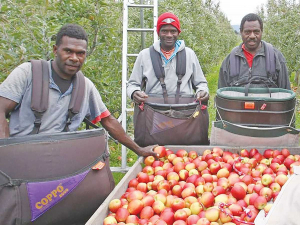Fruit fly discovery puts growers, exporters on edge
Fruit growers and exporters are worried following the discovery of a male Queensland fruit fly in Auckland this week.
 Horticulture NZ’s Mike Chapman says government delays have caused RSE workers and their employers unnecessary anxiety and cost.
Horticulture NZ’s Mike Chapman says government delays have caused RSE workers and their employers unnecessary anxiety and cost.
Horticulture NZ says it welcomed increased Government support and flexibility for the Recognised Seasonal Employer (RSE) workers who are still in New Zealand waiting for repatriation back to the Pacific.
However, it says these decisions which were made back in July should have come a lot earlier.
“We really needed this decision back in April. While local communities have rallied to support RSE workers, government delays have caused RSE workers and their employers unnecessary anxiety and cost,” HortNZ chief executive Mike Chapman says.
“Immigration New Zealand is now providing the RSE workers who are still in New Zealand with the flexibility to move around the country to take up other horticulture jobs – as well as jobs in other industries.”
Chapman says it means that the RSE workers who have been stranded in NZ won’t have the extra time they have spent in the country count against them, when they return to New Zealand next season.
“At the same time, RSE employers can now apply for in-kind assistance to help them provide the RSE workers still here with basic needs, such as food and accommodation, under the Government’s Assistance to Foreign Nationals Impacted by Covid-19 Programme.”
Chapman says out of the approximately 9000 RSE workers still in New Zealand, 4000 are waiting to get home.
“Summerfruit NZ, NZ Apples and Pears, NZ Kiwifruit Growers Incorporated and HortNZ have worked in partnership with the Government to find ways to get these workers home safely and as quickly as possible. More than 1000 RSE workers have made it home thanks to these efforts, which continue.”
He says that while it is good that these workers are now going home, it is important that the RSE scheme continues as it supports both New Zealand and the Pacific nations.
“Horticulture will contribute significantly to the post-Covid recovery, and the RSE scheme is a cornerstone of that recovery.
“The scheme has operated for more than 10 years. It has ensured that the New Zealand horticulture industry has been able to grow and provide permanent employment for thousands of kiwis.”
Chapman says as horticulture spearheads New Zealand post-Covid recovery, skilled RSE workers in similar numbers to this year will be needed to complement any local entering the horticulture industry for the first time.
“The RSE scheme is vital to the Pacific,” he adds. “The scheme enables these workers to earn money to support their families back home, set up businesses, and build storm proof houses, schools and community facilities.”
Another extension
In late August, the Government announced that it is extending RSE visas by six months, allowing these workers to stay and work in New Zealand.
The extension took effect from 18 August 2020 and will apply to all RSE workers whose visas expire between 18 August and 31 December 2020. RSE workers who wish to continue to work in New Zealand for the same purpose after this additional six months will also be able to apply to stay longer. The requirement to return to their home country between seasons has been lifted in light of Covid travel restrictions.
The World Wide Sires National All Day Breeds Best Youth Camp Best All Rounder plaudit has become family affair, with 2026 Paramount Cup winner Holly Williams following in her sister Zara's footsteps.
DairyNZ is giving New Zealand farmers a unique opportunity to gain hands-on governance and leadership experience within the dairy sector.
Herd improvement company LIC has posted a 5.2% lift in half-year revenue, thanks to increasing demand for genetics.
According to the latest Fresh Produce Trend Report from United Fresh, 2026 will be a year where fruit and vegetables are shaped by cost pressures, rapid digital adoption, and a renewed focus on wellbeing at home.
The Roar is a highlight of the game hunting calendar in New Zealand, with thousands of hunters set to head for the hills to hunt male stags during March and April.
OPINION: The past few weeks have been tough on farms across the North Island: floods and storms have caused damage and disruption to families and businesses.